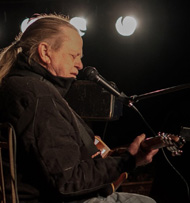 |

copyright 2016 Andy Keenum
|
 |
|
PANAMA RED, American musician, Songwriter, and Chronicler of the Human Condition
“There are those, guitar in hand, who still prowl the seamy outskirts of greatness. PANAMA RED is one of them... songs that remind you
of Townes, Billy Joe Shaver and Blaze Foley in turn.”
Dave Pilot, Outlaw Magazine
So, you ask yourself, who is this Panama Red? The answer is simple: an original Texas Jewboy and a co-writer with Kinky Friedman, Billy Joe Shaver and Ronny Elliott, Panama Red was a fixture in the 1970s Music Row Outlaw movement in Nashville. His sphere of influence has grown lately to include an annual stint on and in European stages and bars. His often irreverent stage comments are interspersed with original, intelligent songs which have been described as "honest', "elegant', and "soulful", by such luminaries as Kris Kristofferson, Billy Joe Shaver, and David Olney. He currently lives "just far enough" outside of Nashville.
His songs have been recorded by Jerry Lee Lewis, Billy Joe Shaver, Kinky Friedman, Gamble Rogers, Felix Pappalardi, Bobby Bare, Mike Auldridge, the French band Mary-Lou and a host of others.
He has appeared as a player and singer on more than 100 albums and CDs recorded in Nashville, Los Angeles, New York, Miami , Seattle and Europe. The Original Panama Red began life as Danny Finley, born in West Virginia and the descendant, literal and musical, of Scots-Irish immigrants of the early 1700s. He began his writing career in the US Army as a stringer for Pacific Stars and Stripes. On his discharge he went to San Francisco/Oakland where he acquired the “Panama Red” sobriquet. He managed a coffeehouse, the Cafe I, on 10th Street in New York City. Later, after a memorable life chapter involving the Beaux Arts Coffee House in St. Petersburg, Florida, he was a founding member of the jazz fusion band Bethlehem Asylum out of Coconut Grove, making two records for Ampex Records. He relocated to Nashville in 1972 and became Billy Joe Shaver's guitar player and co-writer, later also filling the same functions for Kinky and The Texas Jewboys.
He parted from the Jewboys in 1975 and began performing as The Legendary Panama Red with his band Montezumas Revenge. From 1976 to 1979 he toured in his 1947 Silversides GM road bus with his band and was one of the first acts to appear at the Lone Star Cafe in New York City. He performed at Armadillo World Headquarters in Austin, Texas, the Horseshoe Tavern in Toronto and at the Old Mill in Mill Valley, California as well as numerous other venues all around the U.S. and Canada.
His work and song writing brought him to the attention of the producer/bassist Felix Pappalardi (Cream, Mountain), who subsequently became his friend, mentor and employer. After Felix's untimely death in 1982, Panama entered into a period of solitude and he became a carpenter. He studied computer science at Miami Dade College. While a radiography student at Northern New Mexico College, he edited portions of a radiologic physics textbook (Radiologic Science for Technologists, Bushong, 4th Edition). He graduated with a GPA of 3.89 and is a member of Phi Theta Kappa. He also studied at the University of New Mexico, majoring in journalism. In the 1990s, after living in San Francisco and working as an xray tech, he again started playing music and lived and played in Nevada City, CA and Seattle, ending up in Amsterdam, Netherlands for a couple of years. On the road again and always a little off….
Since his return to music he has made two albums (HomeGrown and Choice Buds), and has appeared in numerous small venues in North America, interspersed with performances as a solo artist and guitarist in Norway, Sweden, United Kingdom, France and the Netherlands. He continues to write and perform and currently lives in Rockvale, Tennessee. He has agreed to perform with his friends and musical associates in Muscle Shoals for the upcoming TV special being done in April 2017 . He continues to tour listening rooms, and is working on multiple publishing projects, including a music memoir and a whimsical book about cats…
He is credited by etymologist Barry Popik with the first use of the
rhyming phrase "Lost in Austin" the title of one of his country swing
songs. (1976).
-30-
|